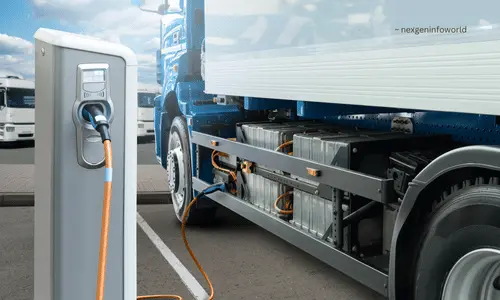The automotive industry worldwide is in transition toward electric vehicles (EVs) due to climate change-induced carbon emission cuts and rapid technological development. While electric cars and bikes have garnered substantial media coverage, electrifying heavy-duty trucks is the next essential frontier, particularly for an emerging nation like India.
Driving towards Net Zero Electric trucks can drastically decrease carbon emissions and air quality issues in India while contributing towards its climate goals. Electric trucks convert more of their battery power directly to propulsion than their diesel counterparts resulting in reduced energy use per distance traveled compared to diesel. A deliberate transition toward zero emission trucks through 2050 may save between 2.8-3.8 gigatonnes cumulative CO2, equal or exceeding India’s economy-wide annual greenhouse gas emission estimates at present.

As fluctuating prices of fossil fuels and environmental concerns bring greater awareness, there has been increasing support for finding sustainable and economically feasible solutions. Adopting electric trucks could significantly lower India’s energy needs while improving energy efficiency and decreasing dependence on imported oil imports – road freight currently accounts for 25% of oil import expenditures and is expected to double by 2050; zero emission truck (ZET) adoption could reduce oil expenditure by an estimated Rs 116 lakh crore per annum through 2050.
Attracting Green Energy
Utilizing green energy sources is of vital importance when considering electric truck adoption as their environmental benefits could otherwise be compromised by continued dependence on fossil fuels for electricity production. According to International Energy Agency and National Renewable Energy Laboratory research, charging stations could use renewable sources like solar or wind power instead, further decreasing overall energy consumption.
Carbon emissions reduction and decreased dependency on imported oil imports have pushed governments into supporting electric trucks as the preferred mode. Now these electric trucks are enjoying widespread support among many others as well. Nayi Soch Ki Sawaari, an initiative creating awareness around electric trucks in India, reported that over 80 percent of drivers expressed an eagerness to experience electric trucks as one of their options. Drivers noted a possible improved driving experience due to clutch-free drivetrain and modern air conditioned cabins as one primary motivator; another key motivation included contributing towards creating a healthy environment for future generations of their children’s future and short charging times of electric trucks providing necessary downtime while on long hauls.
Resolving Challenges and Opportunities
Convincing fleet owners will require more than simply an enjoyable driving experience or environmental benefits alone to convince them. Addressing range anxiety, myths about safety and performance, high upfront costs, inadequacy of charging infrastructure, consumer concerns or other anxieties will be necessary – yet these challenges offer opportunities for innovation and collaboration; advancements in battery recycling or second life applications might lead to new industries or job openings; while localized charging solutions might spark technological development or spur technological entrepreneurship.
Electric truck revolution presents an ideal opportunity for gender parity within automotive and logistics industries, traditionally male-dominated. By supporting policies and initiatives which encourage greater diversity and inclusion of women drivers – this might even improve driver-truck ratio which currently stands at around 750 drivers for every 1000 trucks! Empowering women through targeted training programs and inclusive policies ensure that its benefits can reach as widely as possible.
Establish a Reliable Ecosystem
Electric truck success will depend upon creating an inclusive and robust ecosystem that encompasses manufacturers, fleet operators, government agencies and industries in its transition towards electrification. To do so successfully requires collaboration among these stakeholders. Manufacturers must create vehicles tailored specifically for Indian market conditions, such as dealing with various road conditions and heavy loads. Government bodies should support this transition with supportive policies, incentives and infrastructure development measures; fleet owners/operators/drivers need to be educated about long-term economic advantages of electric trucks while receiving training to safely utilize this new technology to achieve optimal performance and ensure safe operations.
Overall, electrifying heavy-duty trucks presents significant challenges; yet its electrification offers immense promise to change the transport sector, reduce carbon emissions and create a sustainable future. Through collaboration, innovation and a firm commitment to green energy sources such as electric trucks can become integral parts of India’s automotive industry on its journey toward net zero emission levels.
